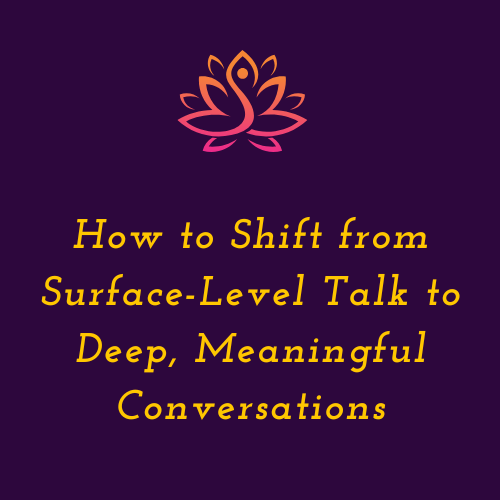How to Shift from Surface-Level Talk to Deep, Meaningful Conversations

Have you ever found yourself in a conversation that felt, well… shallow? We all have. The kind of talk where you exchange pleasantries, talk about the weather, or gloss over topics that barely scratch the surface. While small talk has its place, constantly staying at that level can leave us feeling disconnected. After all, what we truly crave are meaningful connections—the ones where we feel seen, heard, and understood.
The good news? Moving from surface-level talk to deep, fulfilling conversations isn’t about having some magical formula. It’s about making small shifts in how we approach our interactions. Let’s explore some practical ways to start having conversations that matter.
1. Start with Genuine Curiosity
Ever noticed how engaging conversations seem to flow naturally? It usually begins with genuine curiosity. When you’re truly interested in the other person, it shows. Instead of asking, “How was your weekend?” try asking, “What was the best part of your weekend?” or “Did anything surprise you this week?” Open-ended questions invite the other person to share something beyond the typical responses, opening the door to a deeper exchange.
Tip: Approach each conversation with a mindset of curiosity, as if you’re learning about a fascinating story. People can sense when you’re genuinely interested, and it encourages them to open up.
2. Listen to Understand, Not Just to Respond
This one’s a game-changer. Too often, we listen just enough to plan our next response, waiting for our turn to speak. But if we want to create meaningful connections, we need to listen with the intention of truly understanding the other person. Give them your full attention—put away distractions, make eye contact, and let them finish their thoughts before you jump in.
When you’re genuinely listening, the conversation flows deeper naturally. People feel heard and understood, which fosters trust and opens the door for more authentic sharing.
Tip: Practice “active listening” by paraphrasing what the other person says before responding, like, “So you’re saying that…” or “It sounds like you felt…” This small gesture shows that you’re truly engaged.
3. Be Willing to Share Your Own Stories
Deep conversations aren’t just about asking questions. They’re about sharing pieces of yourself, too. Vulnerability is powerful. When you’re open about your own experiences, challenges, or emotions, it invites the other person to do the same. This doesn’t mean oversharing but offering a glimpse into who you are.
For example, if someone shares a challenge they’re facing, you might respond with, “I went through something similar recently, and it made me rethink things…” Opening up in this way creates a safe space where you can connect on a deeper level.
Tip: Aim to share relevant and relatable stories, ones that the other person can connect with or learn from. This way, the conversation becomes a two-way street, enriching both of you.
4. Embrace Silence as Part of the Conversation
Ever feel the need to fill every pause with words? Silence can feel uncomfortable, but in meaningful conversations, it’s a powerful tool. Pausing after someone speaks allows you both a moment to reflect and process. Sometimes, those few seconds of silence can encourage the other person to dig deeper or reveal more than they might have otherwise.
Tip: Try to take your time filling the silence. Let there be a natural pause; you’ll often find that this is where some of the most honest, thoughtful moments happen.
5. Ask Follow-Up Questions That Show You’re Engaged
A single question can start a conversation, but the follow-up questions take it deeper. When you ask follow-up questions, you’re showing the other person that you’re not just listening but actively engaging and invested in what they have to say. It moves the conversation from “interview mode” into something more personal.
For instance, if someone mentions excitement about a new project at work, don’t just stop there. Ask, “What part of it are you most looking forward to?” or “How did you get interested in that field?” These questions signal that you’re genuinely interested in their experiences.
Tip: Follow-up questions don’t have to be complicated. Often, a simple “Tell me more” or “How did that make you feel?” can be all it takes to draw someone out.
6. Create a Safe Space for Honest Sharing
Meaningful conversations happen when people feel safe to express themselves without fear of judgment. You can foster this by being non-judgmental and empathetic in your responses. Instead of jumping to conclusions or offering solutions right away, try to focus on understanding their perspective first.
If a friend confides in you about a mistake they made, resist the urge to give advice unless they ask for it. Sometimes, all they need is a listening ear. Creating this sense of safety allows both of you to explore topics that go beyond the surface, opening the door for real, honest conversation.
Tip: Show understanding by saying things like, “That sounds tough,” or “I can see why you’d feel that way.” It lets them know they can share openly without fear of being judged.
Building Connections That Last
Meaningful conversations are the foundation of strong relationships, whether personal or professional. When we take the time to go beyond surface-level exchanges, we create opportunities for genuine connection. The people around us feel valued, heard, and understood. And, ultimately, that’s what we all want, right?
Ready to Take Your Conversations to the Next Level?
If you’re intrigued by the power of deeper, more meaningful conversations, you’ll love my upcoming book, “Communication: The Key to Your Success.” It’s filled with insights, practical tips, and real-life examples to help you become a more authentic and impactful communicator. Imagine the connections you could create!
Stay tuned for the release, and in the meantime, start implementing these tips. You might be surprised at how quickly your conversations shift from ordinary to extraordinary.
#MeaningfulConversations #DeepConnections #EffectiveCommunication #ActiveListening #RelationshipBuilding #AuthenticCommunication #Vulnerability #CommunicationTips #ConnectionMatters #PersonalGrowth



